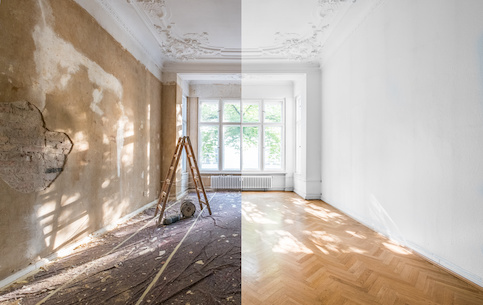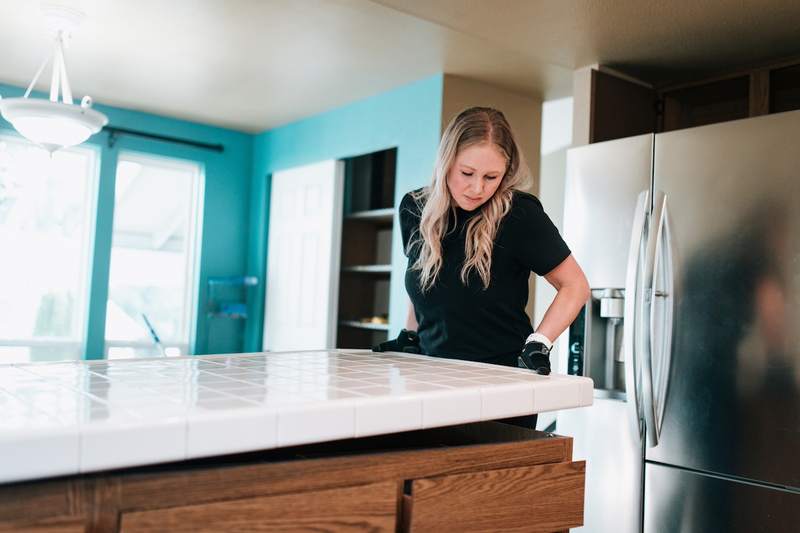One of the requirements to be approved for a VA loan is a property appraisal. Not to be confused with a home inspection, an appraisal determines a home’s value and is almost always necessary for securing a VA loan.
Let’s take a closer look at VA appraisals, including how they’re different from standard appraisals and what their process means for VA loan borrowers.
What Is A VA Loan Appraisal?
A VA appraisal is an appraisal performed by someone certified through the U.S. Department of Veterans Affairs (VA). It’s a professional valuation of the property’s market value, or how much the home you’re trying to buy or refinance is actually worth. This value is established by inspecting the house and comparing it to recent sales prices on real estate “comps,” which are similar or comparable homes in the same area.
The appraisal is important to your VA loan process for three main reasons:
- You want to make sure you’re not overpaying or borrowing too much for a home.
- Your lender can’t loan you more than the home is worth.
- The appraisal ensures that the home meets the VA’s minimum property requirements (MPRs), which involve checking for basic safety and livability features.
How Much Are VA Appraisal Fees?
It’s hard to say exactly how much an appraisal will cost, because it depends on where you live and the characteristics of the property. If the appraiser must travel a good distance to the property or has to inspect multiple units, it could cost you more. You can pay VA appraisal fees or negotiate with the seller to pay them as a seller concession.
A great resource to find the maximum appraisal fees for your state and county is the VA website. Your VA appraisal fee could be as low as $550 or as high as $2,000 or more, depending on your area and the characteristics of your home.
See What You Qualify For
Buy A Home
Discover mortgage options that fit your unique financial needs.

Refinance
Refinance your mortgage to have more money for what matters.
Tap Into Equity
Use your home’s equity and unlock cash to achieve your goals.
VA Loan Appraisal Requirements
VA appraisal requirements differ slightly from the requirements associated with other types of home loans. A home purchased with a VA loan must meet specific criteria established by the VA, and a VA-approved appraiser must appraise the home. More specifically, each appraised home must meet the aforementioned MPRs. These guidelines focus on the home’s electrical and plumbing systems, HVAC functionality and overall structural soundness.
Like traditional, non-VA appraisers, VA appraisers must inspect the property inside and out. They’re also required to select comparable homes, view the exterior of them and perform a comparative analysis. Typically, appraisers look for any problems that could impact a home purchase. The VA prefers homes that are move-in ready.
You can view the full list of MPRs online or see the major requirements below.
Space Requirements
Your VA appraiser will check the property to ensure your prospective home has sufficient space to carry out typical day-to-day activities. Specifically, the home should provide bathrooms, sleeping quarters, and a safe and adequate room for food preparation.
Access And Encroachments
The property needs to be safely accessible to the backyard and from the street. Private streets should be maintained in accordance with some form of homeowners agreement that won’t place an undue burden on you for maintaining the road.
The VA appraiser will note any encroachments of your property onto a neighbor’s property, and vice versa.
Hazards
Your VA appraiser will inspect the property to ensure no existing damage or imminent danger from natural hazards such as flooding, mudslides, avalanches and sinkholes. They’ll also check for other hazards, including lead-based paint, radon gas and environmental contamination.
Utilities
One issue that appraisers often report is the lack of an efficient and acceptable heat source inside the home. A heating system must maintain a minimum temperature of 50 degrees Fahrenheit in the plumbing areas of the house.
Also required are adequate and code-approved electrical systems with all the proper fixtures.
House Structure
VA appraisers also check the roof, attic, crawl space and basement for signs of water damage or other obvious structural problems. Faulty windows can be a huge issue on a VA appraisal report.
Manufactured and modular homes carry a few additional requirements designed to guarantee they meet all the state and local standards to be classified as real estate.
Pest Inspection
One big element unique to VA loans is a pest inspection, during which an inspector will check for insects – such as termites – that eat into wood.
There are no restrictions on who can pay for a pest inspection. If expenses are an issue for the seller, offering to pay for the inspection could help get your offer accepted.
The VA requires pest inspections in all but these 11 states: Alaska, Colorado, Idaho, Maine, Minnesota, Montana, North Dakota, Oregon, South Dakota, Wisconsin and Wyoming. In some states, inspections are only required in certain counties.
How To Complete The VA Appraisal Process
Now that you know what a VA appraisal looks for, let’s break down what you can expect from the process itself.
1. Scheduling
During the VA loan process, you’ll need to schedule a VA-approved appraiser through your mortgage lender. The VA handles the scheduling and randomly assigns an appraiser to your property. Typically, the appraisal is requested early in the VA loan process to guarantee enough time to address any issues the appraiser uncovers.
2. Timeline
Along with imposing appraisal fees, the VA sets standards for how long the turnaround on an appraisal can be, but this varies by state. Across the U.S., appraisers have 7 – 21 business days to complete their reports. This doesn’t necessarily mean the whole process will be complete in under 3 weeks, however. If you need repairs, the process could take considerably longer.
3. Appraisal Procedure
Appraisers must include a location map, building perimeter sketches and photographs of either the sale property or the lot where a new home’s construction will take place. They also provide an itemized list of repairs to be completed for VA loan approval.
This list includes any corrections needed for the property to conform to regulations set by the Department of Veterans Affairs. Then, the VA appraiser must personally make the final value estimate and sign their name to the report.
The VA will then review the appraisal report and issue a VA Notice of Value.
4. Home Inspection
It’s important to note that your VA appraisal doesn’t cover the same ground as a home inspection. Regardless of your loan type, a home inspection and appraisal are different parts of the home buying process. Home inspections take a more in-depth look at a home’s physical condition, examining the structure, attic, basement, electrical system, plumbing and other parts of the home.
While the VA appraisal process has some basic checks in place to assure safety and livability, it would still be wise to get a professional home inspection before finalizing your purchase.
5. Closing
Once you’ve made it through the VA appraisal and inspection process, you’re ready to close. Closing costs typically look about the same with a VA loan as they do with other types of home loans. Most buyers must pay a VA funding fee, but you can pay this at closing or have it rolled into the loan. Disabled veterans, among others, can waive the VA funding fee, so make sure to check with your lender to verify if you qualify for a VA funding fee waiver. It’ll save you thousands of dollars.
A good real estate agent will let you know what to expect at closing and help make the closing process – which culminates with closing day – run as smoothly as possible.
Guide to VA Loans
Discover a more affordable loan option for United States Veterans, Service Members and spouses.
Ways To Handle Problems With Your VA Appraisal
Not all VA appraisals go flawlessly, potentially complicating the home buying process. Being prepared can help you deal with issues – which we’ll list and discuss next – if they arise.
The Property Doesn’t Meet MPRs
If your appraiser determines the property doesn’t meet minimum property requirements and needs repairs, you’ll need to get those taken care of before you secure your VA loan. Ideally, the seller will agree to pay for these repairs, but they aren’t obligated to do so. If they refuse, you can pay for them or walk away from the property.
Be sure to consult your real estate agent and lender to discuss your options. Weighing the pros and cons in this situation can be hard if you’re not a VA loan expert.
The Appraisal Is Lower Than Expected
The appraisal sets a ceiling on how much you can borrow with your VA loan. If the appraised value of the home is less than the sales price, you might not have the funding to cover the purchase.
You have the option of covering the deficit in cash, but that isn’t a realistic option for many home buyers. If that’s your situation, you’ll have to negotiate with the seller, ask the VA to reconsider its appraisal or simply walk away from the property. It’s important to note that a reconsideration of value can only be granted by working with your lender and proving that the appraiser made errors that impacted the valuation.
A low appraisal can be a tough situation to navigate, so make sure to speak with your real estate agent and lender to determine the best course of action.
VA Appraisal FAQs
Below are a few frequently asked questions about the VA appraisal process.
Are VA appraisals tougher than non-VA appraisals?
VA appraisals aren’t necessarily more difficult than conventional appraisals, but the Department of Veterans Affairs does require that homes meet the VA’s minimum property requirements. These standards can be stricter because, before approving the mortgage, the VA wants to solidify that the veteran will be safe and secure in their new house.
Can I use the same VA appraiser more than once?
The Department of Veterans Affairs randomly assigns VA loan appraisers, so you won��’t be able to request a specific person to perform your appraisal or encounter the same appraiser more than once. This process prevents any bias or conflict of interest with your VA home loan.
Are VA appraisals required on loan refinances?
VA appraisals are required to get a VA cash-out refinance or a rate-and-term refinance when you’re switching from a different loan type. However, you may not need an appraisal for a VA Streamline Refinance (IRRRL).
What will fail a VA appraisal?
The VA wants homes to be move-in ready for homeowners who are veterans, so any major structural issues that may affect their health and safety can result in a low appraisal. Common issues include insufficient heating and electrical systems, water damage, roof damage, rotting wood and pest damage or infestation.
The Bottom Line
A VA appraisal doesn’t have to be a daunting step in your effort to buy a home. Learning more about the process is a great start, but it also helps to have the right team backing you up. Make sure your real estate agent and lender are both well-versed in VA property guidelines so they can guide you through the home buying process with ease.
Find out if a VA loan is right for you.
See rates, requirements and beneifts.

Victoria Araj
Victoria Araj is a Staff Writer for Rocket Companies who has held roles in mortgage banking, public relations and more in her 15-plus years of experience. She has a bachelor’s degree in journalism with an emphasis in political science from Michigan State University, and a master’s degree in public administration from the University of Michigan.












